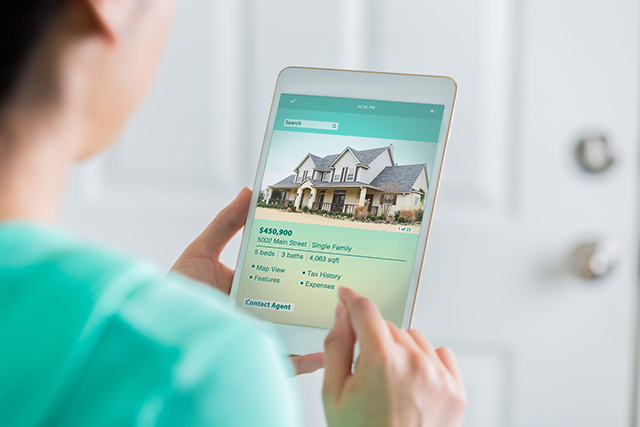Scoping out properties on real estate apps and websites has become something of a trend, especially in today’s white-hot housing market. Some of these sites are visited more than 100 million times each month. They’ve even pushed themselves into the pop culture lexicon.
Real estate websites can be great tools to narrow down the overwhelming number of homes that are for sale at any given time, ultimately leading you to your dream home. But as convenient as it is to peruse every available home in your area, these sites do have some potential pitfalls.
Here are some pros and cons of using real estate apps and websites.
Pros
A Large Database
The most significant advantage these websites have is the vast amount of listings in their database. Zillow, for example, has more than 110 million listings on its site at any given time (although this number also includes rental properties). This allows potential homebuyers to peruse any type of home in any region of the country with just a few simple clicks. Furthermore, most of the major sites have real estate apps on both Apple and Android platforms, allowing users to access all this information on their phone or tablet. Simply put, it’s never been easier to search for a new home.
Community Information
Realty apps and sites can provide useful snapshots of the community that would otherwise be difficult to ascertain if you’re new to an area. Some helpful neighborhood insights you may find listed include maps, information about nearby schools, local crime rates, transportation options and the value history of nearby homes.
Notifications and Saved Searches
Even with millions of listings, it’s possible the home you’re looking for simply isn’t available yet. If this is the case, real estate apps and websites have some helpful tools for you. First, is the saved search option. Let’s say you’re looking for a four-bedroom, two-bathroom house with a pool for less than $800,000. You can apply all of those filters to your search results and save them, allowing you to view all the qualified properties with just one click the next time you visit. Even better, you can sign up to receive notifications that will alert you when a new property that meets your needs gets added to the site.
Tools and Calculators
Real estate websites use all the digital world has to offer with tools and features you can’t get in a brochure. These may include 3D home tours, virtual open houses, interactive maps and even a feature that allows users to take a photo of a home’s real estate sign and get details on the property right away. Many sites also have mortgage calculators to give users an idea on how much a particular home would cost each month.

Cons
Accuracy
One of the main issues with realty apps and websites is the accuracy of their listings. In some cases, sites will pull a property’s information from municipal tax databases and multiple listing services, but in others, a realtor or homeowner will manually input the information. In the latter scenario, some stats may be inaccurate or out of date.
Some companies have worked to improve accuracy by having information validated, but users should still confirm anything they see or read on a site. It’s a good idea to consult a professional real estate agent to help interpret what you find online.
Price
A number of sites have tools that give home price evaluations. However, because the sites don’t always have the correct info on a property, these estimates should be taken with a grain of salt. Take for example, Zillow, one of the most popular real estate listing websites.
Nationally, according to Zillow itself, the site’s price estimate is within 5% of the actual selling price roughly 85% of the time. But this number fluctuates from state to state and region to region. In all the states of the Northeast, for example, Zillow’s 5% accuracy is below the national average, bottoming out at New York’s 72.5%.
In Zillow’s defense, it states that this tool is not an appraisal and should simply be used as a “starting point” for determining a property’s value. But many users haven’t gotten that message, and people who say Zillow is misleading prospective homebuyers have sued the site.
Featured Listings
Just like search engines, most real estate apps and websites have featured or sponsored listings. These homes appear at or near the top of any search results within the site, even when you sort the results using a filter. Make sure to look out for a note on their listing that designates their “featured” status and take that into consideration when looking for your dream home.
Privacy
Most realty apps and websites are free to use, and you can peruse all the listings and pull pertinent information without providing anything. However, in most cases, if you want to access all of the site’s features, you’ll need to give up some of your personal info, such as your name, email address and other information.
For instance, if you find a property you’re interested in, you’ll likely need to create a profile or at least submit contact information to get more info on a property or schedule a tour. While you might be fine with being contacted regarding a specific home, providing your number and email address could open you up to a wave of sales calls and emails from outside companies. You can visit OptOutPrescreen.com ahead of time to avoid unsolicited offers or junk mail.
When you’re ready to purchase a home, AAA is here to help. To learn more our home loan services or to speak to a mortgage specialist now, visit AAA.com. For ways to save even more at home, go to AAA.com/HomeServices.
One Thought on “The Pros and Cons of Real Estate Apps”
Leave A Comment
Comments are subject to moderation and may or may not be published at the editor’s discretion. Only comments that are relevant to the article and add value to the Your AAA community will be considered. Comments may be edited for clarity and length.


















I am a real estate broker in New York City with thirty years’ experience. I caution anyone who is looking for a home to tread carefully with Zillow. Their “Zestimate” of value is nonsensical because Zillow often bases it on properties that are not comparable to each other. For example, a cooperative apartment is often compared to a house; it can also be compared to a property in another municipality which is an invalid basis for comparison. Furthermore, Zillow estimates the monthly expense to finance the property. This is also invalid because Zillow does not know how much an individual buyer is putting down in cash or what are the mortgage and co-op loan rates in the area. Therefore, if the buyer puts down 20% or 60% of the price then you can see that the monthly payments will be very different and, for several reasons, loan rates differ. Also, I see inaccurate entries regarding school districts. And so on.